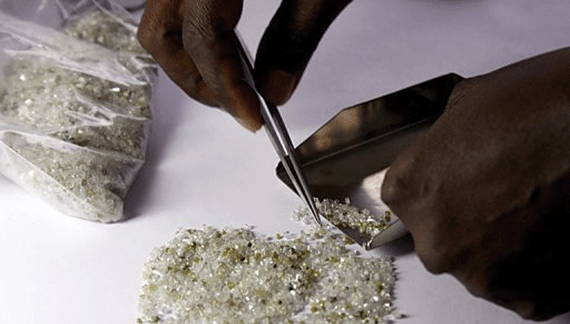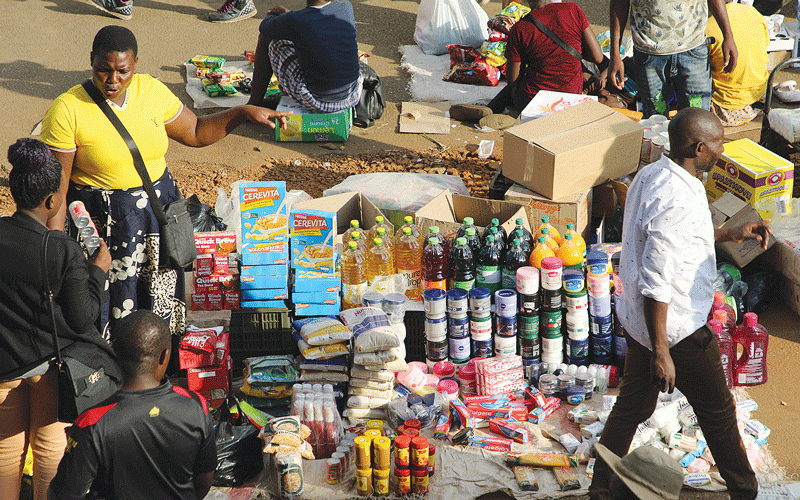
CHIADZWA — The loss of land and a gender hierarchy, among other factors, are forcing some young girls — with parental consent — to forsake school and turn to sex work on diamond mines in the Marange region of eastern Zimbabwe.
“Commercial sex among girls as young as 12 years has become a natural way out of poverty for these children and their families. They are using it as a coping mechanism in the wake of the negative effects on household livelihoods caused by mining activities in Marange,” Melanie Chiponda programme manager of the Chiadzwa Community Development Trust (CCDT), an NGO, said.
Nationally, about 2.2 million people are faced by food insecurity, but food shortages and rising levels of poverty in communities in Manicaland province’s diamond fields are being attributed to the “resource curse”.
In 2008, artisanal miners were flushed from the Marange diamond fields by government security forces, and the state then issued commercial mining licences. Seven companies now mine the 60 000 hectare fields, but proximity to wealth has undermined rather than improved livelihoods.
“The mines took away pastures and farmland from the locals . . . This worsened hunger and affected household income, as families traditionally sold some of their crops and livestock to raise money for food, school fees and other basic needs,” Chiponda said.
Local communities have also been excluded from low-skilled jobs on the mines because companies have branded them as lazy and disobedient, and rely on migrant workers from other provinces instead.
“Unfortunately, girls become part of the dirty game. Some of the girls get food handouts as payment for sex” “Thousands of married men live in [single-sex] hostels at the mines and women are not allowed inside them.
Given that most of the men come from faraway places, they end up resorting to commercial sex and, unfortunately, girls become part of the dirty game. Some of the girls get food handouts as payment for sex,” Stella Washaya (50) a Marange villager and volunteer counsellor for vulnerable young girls, said.
- Chamisa under fire over US$120K donation
- Mavhunga puts DeMbare into Chibuku quarterfinals
- Pension funds bet on Cabora Bassa oilfields
- Councils defy govt fire tender directive
Keep Reading
Mine companies have now banned villagers from selling their produce, but between 2006 and 2008, artisanal miners stimulated the local economy by buying foodstuffs from the community.
The companies also have a policy of confiscating livestock roaming onto their concessions, and mining activities have destroyed forests. In times of food insecurity, livestock are seen as a last resort, and wild fruits from the forests are eaten or sold along highways.
Freeman Bhoso, executive director of the Zimbabwe Natural Resources Dialogue Forum (ZNRDF), an NGO advocating sustainable and equitable exploitation of mineral resources, said that child sex work was a “natural offshoot” of the community’s exclusion from the diamond fields.
“Communities are not benefiting from the exploitation of resources, but are getting further impoverished. As a result, household members are forced to engage in activities – some of them life-threatening – that guarantee them bare survival. Child commercial sex is a symptom of poverty,” he said.
Washaya said: “Commercial sex among young girls has become a social crisis here. There are several thousands homesteads in Marange and I would say one in every five of these has at least one [girl] teenager engaging in sex for money.”
A nurse at one of the few health centres in the area who declined to be identified said: “We attend to at least 20 girls a month who have contracted STIs (sexually transmitted infections). The men . . . insist on unprotected sex, a trend worsened by the fact that there are no programmes designed to educate them against the risky practice. Many young girls have dropped out of school due to unwanted pregnancies.”
“Now that I have a child, the burden has grown and sex with men is the easiest way to get some money”
In Marange, the prevalence of Apostolic religious communities advocating a boy’s education ahead of a girl’s, has seen some parents encouraging their daughters to enter the commercial sex trade to support the family, Washaya said.
Mary Sithole (15) the mother of a two-month-old baby said her child was born with deformed legs during a home birth, as her Apostolic church prohibits members from going to hospital. She claims a Chinese mine manager at Anjin — a diamond mining company – is the father, but he has denied both responsibility and child support.
Mary dropped out of school after completing primary school education. “My father decided to go to Botswana after the mine (Anjin) took away our land and left us with a small field to grow crops.
“Mother followed him, and even though they visit, whenever, they can, they send us little money, but I have to take care of my brother and sister.”
She became the head of a family that includes two younger siblings, as well as her newborn. Still breast-feeding, she nonetheless visits the mine hostels and local bars at night, but strong competition means she charges clients as little as $2 a night.
— IRIN










